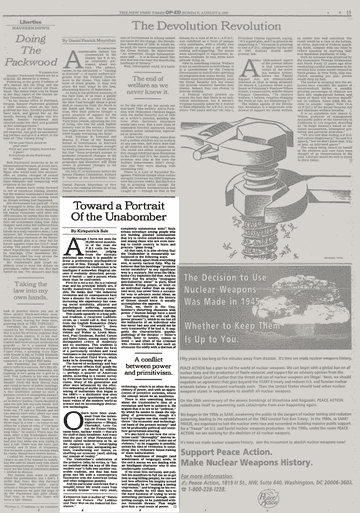Kirkpatrick Sale
Toward a Portrait Of the Unabomber
Although I have not seen the 35,000-word manifesto of the man the F.B.I. calls the Unabomber, judging from the excerpts published last week it is possible to draw a preliminary psychopolitical portrait of him. Enough so that we can understand the Unabomber to be intelligent if somewhat illogical, sincere if evidently disturbed, perceptive if foolish -- and a person whose ideas must be confronted.
First he is not a nut. He is a rational man and his principal beliefs are, if hardly mainstream, entirely reasonable. He thinks that "the industrial revolution and its consequences have been a disaster for the human race," increasing life expectancy but causing social instability, physical and psychological suffering, economic hardship and environmental damage.
This stands squarely in a long political tradition, a recurrent Luddistic strain, as I would call it, that traces from the English Romantics (Mary Shelley's "Frankenstein") down through Carlyle, Dickens, Thoreau, Veblen and Weber to Lewis Mumford, Paul Goodman, Rachel Carson and Rene Dubos, among many other distinguished critics of modernity and its machines. This tradition is very alive today and takes the form of a particularly virulent and vocal resistance to the computer revolution and the so-called Third Wave, which looks to be drowning many of us.
The hatred of technology and fear of its current effects that goads the Unabomber are shared by millions -- perhaps a quarter of American adults, according to a recent survey by Princeton Survey Research Associates. Many of his generation and after were influenced by the effective debunking of myths and delegitimizing of institutions that began in the 1960's -- a disillusion that often included a deep questioning of such basic values of the modern world as science and its increasingly destructive technologies.
Others have been awakened from the technological dream by the nightmares -- Bhopal, Chernobyl, Love Canal, the Exxon Valdez, ozone holes, nuclear waste -- that are the stuff of daily headlines. And many find the pace of what Newsweek recently called technomania to be, as the magazine put it, "outstripping our capacity to cope, antiquating our laws, transforming our mores, reshuffling our economy [and] shifting our concept of reality."
The Unabomber's celebration of the primitive (who, he writes, is "better satisfied with his way of life than modern man") falls into another venerable tradition, one that has been given new life with a contemporary fascination with the American Indian and other indigenous peoples.
And his particular conviction that a simpler, better life would come from a society broken "into very small, completely autonomous units" finds echoes nowadays among people who are building planned communities that try to revive small-town culture and among those who are even moving to Amish country to learn and practice "plain living."
All that said, it is also obvious that the Unabomber is measurably unbalanced in the following ways.
His method, apart from everything else, is surely tactical folly. Why he believes that his bombings "promote social instability" in any significant way is a mystery. Not even the Oklahoma City explosion did that. And his theory that his attacks "propagate anti-industrial ideas" is pure, blind delusion. Killing people, at least on an individual rather than an organized level, has never been a successful way to advance social ideas, as anyone acquainted with the history of dissent should know. It usually accomplishes the opposite.
Then, too, there is the Unabomber's disturbing obsession with power ("Human beings have a need . . . for something we will call the power process"), which to me has all the hallmarks of an individual who has never had any and would not be very trustworthy if he had it. It suggests the characteristic psychopathology of the dictator -- Hitler's profile, loser to lunatic, comes to mind -- and often of the criminal who chooses violence. But such an obsession fits oddly with a distrust of technology, which is so often the machinery of power, and with an appreciation of primitive societies, where the concept would be an anathema.
There is also something bizarre about the Unabomber's idea of a revolution and how to achieve it. He argues that it is not to be "political," by which he seems to mean the toppling of governments, though it's hard to imagine one that could overthrow "the economic and technological basis of the present society" and not be profoundly political and somehow government-altering.
It's also hard to see how the revolution could "thoroughly" destroy industrialism and yet not "make use of violence," as he suggests is possible, unless his idea of revolution is something like a voluntary house-raising or mass hallucination.
Such muddiness of thought (and woodenness of language) aside, in the end it seems we are dealing with an intelligent character who is also intellectually confused.
If we treat him seriously and publish his manifesto in full (so as to get him to stop killing people), he can see just how effective his lengthy screed will actually be in "making a lasting impression," and bringing on his revolution. Maybe he will then turn to the hard business of trying to write something persuasive enough, compelling enough, to be published without homicide threats. That might give him a real sense of power.

